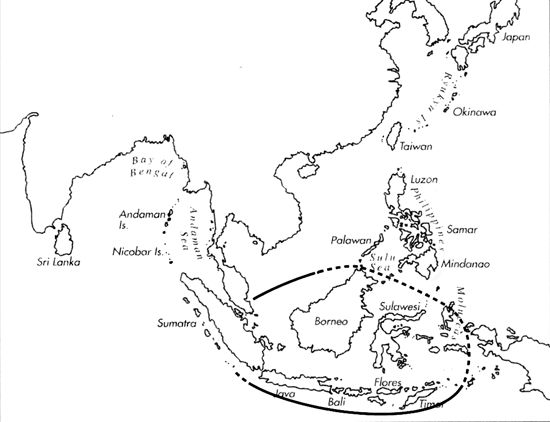
Skip Navigation Links
View access keys for this site.

Range: W. Indonesia, S. Sulu Sea.
Description: Moderately small to medium-sized, usually moderately solid. Last whorl ventricosely conical to conical; outline variably convex adapically, less so to straight below; left side constricted at base or concave basally. Siphonal fasciole may be prominent and basal part of columella deflected to left. Shoulder sharply angulate to slightly carinate. Spire of low to moderate height; outline deeply concave, rather flat in late whorls. Larval shell of 2 whorls, maximum diameter 0.7-0.9 mm. First 3- 6 postnuclear whorls tuberculate. Teleoconch sutural ramps flat to slightly concave, with 0-1 increasing to 5-6 spiral grooves. Last whorl with rather widely spaced, narrow and sometimes finely granulose major spiral ribs; interspaces with axial threads crossing spiral threads and sometimes 1-2 additional minor spiral ribs.
| Shell Morphometry | ||
|---|---|---|
| L | 27-41 mm | |
| RW | 0.09-0.15 g/mm | |
| RD | 0.52-0.58 | |
| PMD | 0.82-0.87 | |
| RSH | 0.10-0.14 | |
Ground colour white. Last whorl immaculate, sometimes with sparse light brown axial lines or streaks adapically. Larval whorls white. Teleoconch spire immaculate, sometimes with small light brown radial markings. Aperture white.
Habitat and Habits: In 20-50 m.
Discussion: C. alabaster is similar to C. mucronatus, C. asiaticus, and C. sculpturatus; for the distinctions, see the Discussions of these species.

C. alabaster range map
This section contains verbatim reproductions of the accounts of 316 species of Conus from the Indo-Pacific region, from Manual of the Living Conidae, by Röckel, Korn and Kohn (1995). They are reproduced with the kind permission of the present publisher, Conchbooks.
All plates and figures referred to in the text are also in Röckel, Korn & Kohn, 1995. Manual of the Living Conidae Vol. 1: Indo-Pacific Region.
The range maps have been modified so that each species account has it own map, rather than one map that showed the ranges of several species in the original work. This was necessary because each species account is on a separate page on the website and not confined to the order of accounts in the book.
Return to framed version (returns to search page)